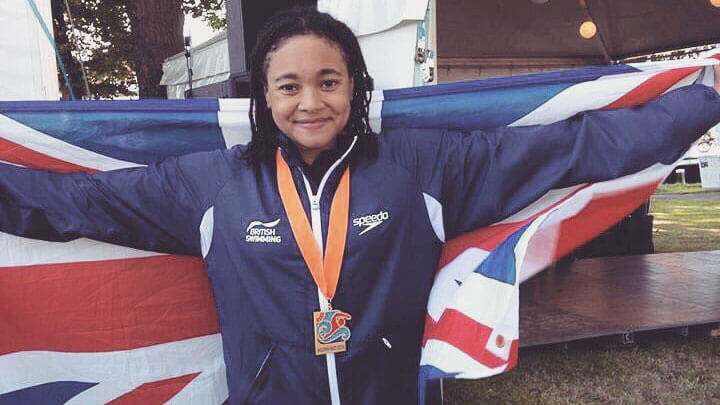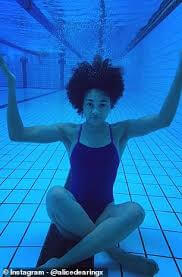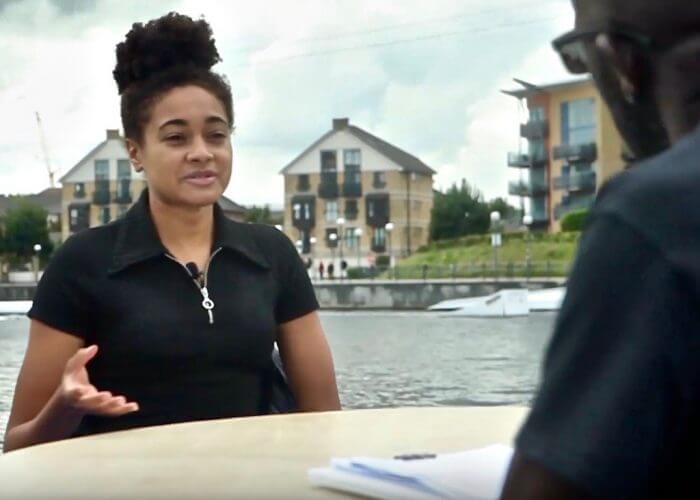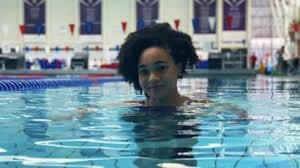Alice Dearing Using Her Voice To Be At The Forefront Of Change In And Out Of The Water

Editorial content for the 2021 Tokyo Olympic Games coverage is sponsored by GMX7.
See full event coverage. Follow GMX7 on Instagram at @GMX7training #gmx7

Alice Dearing had never intended to be a focal point for change but her realisation that she has a voice that can be heard was one of the reasons that led her to become a co-founder of the Black Swimming Association.
Dearing, the 2016 world junior open water champion, co-founded the BSA with BBC journalist and former swimmer Seren Jones, Ed Accura – who starred in and produced the film ‘Blacks Can’t Swim’ – and Danielle Obe, inventor of swim scarves that protect the hair.
It was officially launched in partnership with Swim England in early March to highlight swimming as an essential life skill and to encourage participation as well as prevent drowning in black and minority ethnic communities.

Alice Dearing: Photo Courtesy: Instagram alicedearingx
Dearing, who will seek to become the first black female swimmer to represent Team GB at the Tokyo Olympics in July 2021, had previously spoken about her desire to change perceptions and challenge stereotypes and inspire others to get into the water.
So too had she talked on film to Accura, who leads the Blacks Can Swim campaign and is a co-founder of the BSA.
Momentum was gained and Dearing realised she has a profile that can be harnessed for good.
In an interview with British Swimming, Dearing said:
“It’s difficult, because I’ve always said that I don’t really want to be at the forefront of people of colour in swimming. But at the same time, someone has to do it.
“You need something like that to create the change you want to see.
“The way I have rationalised it is that I didn’t want to eventually retire from swimming and then look back and not have used my voice for something positive in the sport.
“As a child, some of the issues I had going through swimming, I don’t want other people to have those issues, and I want them to realise that anybody of any colour, any background, can swim.
“So I thought I might as well try to use my voice, and we got together a really cool group of people. We all have the same ambition, to get everybody in the water – and we created the Black Swimming Association from it.”
The BSA slogan is “It’s time to change the narrative” with figures released by Sport England showing that 95% of black adults and 80% of black children in England do not swim.
Additional research also suggests that the risk of drowning is higher among ethnic minority communities and one in four children in the UK leave primary school – where swimming is a compulsory part of the national curriculum – still unable to swim.
Pools have been shut since March because of the lockdown imposed in the wake of the coronavirus soon after the official launch of the BSA.
This has resulted in much of the immediate planning being put on hold although it has given Dearing time for long-term thinking, along with Swim England with whom the BSA are in partnership.

Photo Courtesy: Ed Accura
She said:
“I felt that I hadn’t been doing that much towards it, to be honest, with swimming and university and everything – it was quite overwhelming at one point.
“But I finally felt like I was becoming useful and coming into my own within the association.
“It’s difficult, because obviously we are relying on pools opening at some point, because we want to set up swim clinics and teaching days for young children who might never have been in the water. But obviously all of that has to wait until there’s any guidance on when they might open.
“Aside from that, we are looking to go into schools at some point when it’s obviously safe to do so, to showcase the importance of learning to swim.”
Protests and demonstrations have taken place across the world over the past fortnight following the death of George Floyd after he was pinned under a white policeman’s knee for eight minutes 46 seconds in Minneapolis on 25 May.
“Black lives matter in every aspect of life, and water safety is part of that and should not be ignored, as it is an issue which requires attention.”

Alice Dearing: Photo Courtesy: Alice Dearing: Photo Courtesy: Instagram alicedearingx
Dearing would have known by now if she had booked her ticket to Tokyo following the Olympic qualifier which had been scheduled for 30-31 May in Fukuoka, Japan.
She admits she went through an emotional process following the postponement of the Games but eventually accepted it and re-set her sights.
“I couldn’t train, and I kept worrying each day about what was happening and whether I’d be able to go to the Olympics. I struggled with that for about a week or so, but then thankfully it all got postponed and I really just gave my mind a rest then and was like, ‘there’s nothing you can do now, just relax, take it step by step.’
“Eventually I came into quite a good place with it all. I wasn’t that worried about the physical part because I know my body can get back to that, but I had been worried whether my mind would be able to.
“But obviously I’ve taken that time, given myself a break and said, ‘there’s no reason to doubt yourself, you’re obviously capable of doing that again because you did it before’.”




